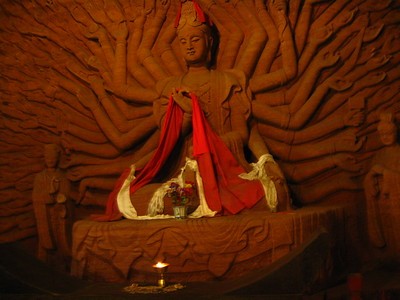The goslings and the terrier

A student uses her Dharma training to confront a difficult situation.
The sun was shining on the tall swaying grass as my two African goslings, now roughly the size of full-grown chickens, happily picked at the dandelion leaves and alfalfa in our field. A stray Jack Russell terrier we’d found two days earlier was tied up to an old water spigot and our coonhound had wandered off after whatever smell beckoned to his nose. All seemed right with the world. Isn’t it usually that kind of moment when something happens to demonstrate we are still living in samsara?
For me it was the approaching sound and sight of a now unharnessed Jack Russell terrier enthusiastically running towards my two goslings. I grabbed one gosling and went for the other who now sensed the approaching danger. Suddenly the world was pandemonium. I screamed “No!” at the top of my lungs, as if that might stop the terrier. As I chased him and the gosling he now had a hold of by the tail, he suddenly turned and lunged at the one in my arms, clamping down hard on the little gosling’s head. I grabbed the terrier with my free hand and pulled him off the poor little goose. Then I took him to our shed and shut him in there.
When I first had the dog in my grasp the geese were lying on the ground as if they were dead. After securing the dog I turned around to see them slowly approaching me, one with a serious limp. I got them back into their safe haven, our chicken coop. They were in very bad shape. The one with the limp had labored breathing that suggested he may have an internal injury. The other, larger gosling no longer had a right eye–he had sustained a severe puncture wound on the left side of his head. I was devastated, certain my carelessness had just killed the goslings.
I returned to the coop and sat with the goslings, apologizing for my part in their devastating injuries. My husband came outside and examined the geese, saying that they would most likely die. A dreadful decision was before me.
Having grown up with livestock, my husband’s solution was to release the goslings from their suffering by killing them promptly. I didn’t grow up with livestock. However, the last chicken I took to the vet cost nearly $200, and after that I decided I could not place that kind of financial burden on my family again. It would have been easy to let my husband just handle it, but I couldn’t. They were my geese and I needed to choose.
Struggling with this decision I sat down on my meditation cushion. Suddenly the vision of our first dog, Lady, came to mind. When she was ailing I had taken her to the vet and had them put her to sleep. I was devastated, but at the time I thought I was doing the right thing. Since meeting the Dharma, I have strongly regretted this choice. Immediately the two situations were linked in my mind and my decision was clear. Even though I felt a strong responsibility to avoid large veterinarian bills, I felt even more strongly that it was not my place to decide when these two goslings should die.
I chose to let them be as they were. If they died, they died. If they didn’t, then they didn’t. While it might sound like an easy choice, it was anything but easy. A few times that evening a vision of my suffering and the terrified goslings came to mind. At those moments I’d go outside, sit in the coop with them and chant Om Mane Padme Hum. Somehow it seemed to calm them and I felt a little better doing something to let them know I was there and cared. As I went to sleep that evening, I felt certain I was looking at waking up to at least one, if not two, dead goslings.
The next morning, I heard my husband tell our daughter that he was going to check on the geese. I roused myself out of bed and got dressed figuring I’d better be a part of whatever result he finds. As I got to the kitchen, he walked through our sliding glass door and said, “I don’t know how many Om Mane Padme Hum‘s you said, but it must have worked. The geese are fine.” I immediately ran out there and they were indeed doing very well. One still had a limp but no more labored breathing and the other was bumping into things as he tried to walk around the coop with only one eye. What effect the chanting had I can’t possibly know, but I do know I’m very grateful that the goslings are back on their feet again. With their condition having improved, I took them to the veterinarian who prescribed antibiotics and an anti-inflammatory to help them on their way to a full recovery.
Over the last few days, as I’ve taken time to process this experience, I’ve observed a couple of things that surprised me. First, and this was probably the hardest thing for me to believe even though I experienced it, I harbored no ill will towards the Jack Russell terrier. Yes, when I had him in my grasp after he’d just harmed my goslings, I was angry with him. Still the only thing in my mind at that time was to maintain a good grip so he couldn’t get to them again. I had no hate or desire in my mind to injure him at all.
The day he attacked the goslings, we took the terrier to the Humane Society. My husband offered to take him in but somehow I knew I had to be a part of this process. As we explained the situation to the folks who were taking the dog—including that he’d likely just killed two geese—I petted him and told him that I forgave him. I let him know that I understood and didn’t blame him for being who he is. I have to say I was and still am incredibly grateful for the spontaneous compassion that came to my heart/mind at that moment due entirely to the Dharma teachings I have had the great fortune to receive from my spiritual mentors and my earnest but sometimes inconsistent practice.
Another observation I made a while later had to do with what was influencing me when I was deciding how to respond to the goslings’ devastating state. I looked at the choice I had made years ago with Lady and the choice that was before me when the geese were attacked. In both instances I observed sentient beings that I loved enduring incredible suffering. But was it their suffering that was actually informing my choices? No, sadly it was my own. I realized that ultimately it was my difficulty with watching those I love suffering that lay behind my considering euthanizing them.
With Lady I ended my own pain in a conventionally accepted way, but I still live with the regret for making the decision to end another sentient being’s life before she would have died naturally. With the goslings, I chose to live with the pain. While the outcome with the geese has indeed been positive, I now know that no matter what had happened, choosing not to take a life, even when death appeared imminent, is a choice I can more easily live with in the long run. One of my Dharma friends reminded me that this choice may have been better for the goslings as well. As long as I don’t have the clairvoyant powers to know if they will be reborn in a fortunate rebirth, sending them on to their next life sooner may in fact subject them to more intense suffering.

